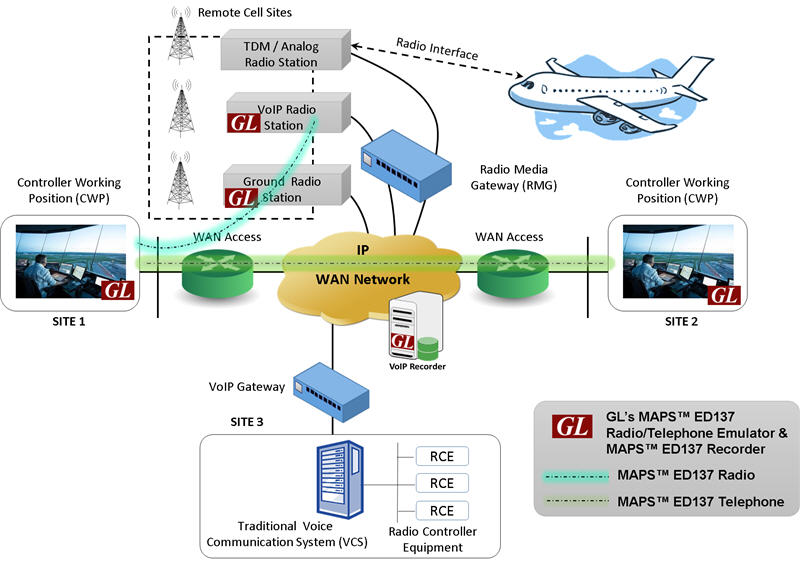GL Enhances
Radio Emulation & Analysis with Support for ED-137C
Gaithersburg, Maryland, USA – September 04, 2017 - GL Communications Inc., announced today its enhanced ED-137 Radio Emulator referred to as MAPS™ ED-137 Radio Emulator.

Speaking to the press, Mr. Jagdish Vadalia, a Senior Manager for product development of the company said, “Continuing with efforts to improvise test tools for Air Traffic Control and Management industry, GL has enhanced MAPS™ ED-137 Radio to simulate VoIP Air-Ground calls as per EUROCAE ED-137C Volume 1 Radio version along with the existing ED137B Volume 1 Radio version.
He added, “The MAPS™ ED-137 Radio simulator software provides complete control over call scenarios testing, and the ability to customize the network parameters for signaling and VoIP traffic. It has the capability of generating more than 500 simultaneous Air-Ground calls.”
Mr.Vadalia, emphasizing on the new features introduced, explained, “In Multicast mode operation, multiple CWPs can send request to have multicast session with GRS to receive multicast RTP packets from GRS. The router or switch with multicast feature will manage the subscription to multicast group and forwards the RTP packets received from GRS to all members of the group.
The new SELCAL feature is a signaling method used to alert the aircraft crew members selectively to an incoming message from a ground station. The CWP endpoints simulated by MAPS™ ED-137 Radio supports sending SELCAL tones to GRS using the SIP INFO method.
GRS endpoints simulated by MAPS™ ED-137 Radio will now support simulation of non-VoIP source PTT Keying. User can simply apply “Key non-VoIP PTT” event on the selected Radio call at GRS. This will trigger GRS to send Normal PTT_ON confirmation with configured PTT-Id (60, 61 or 62) in RTP downstream header to all CWPs indicating that PTT from a non-VoIP source is being transmitted at GRS. PTT-Ids 60, 61 and 62 are reserved for non-VoIP sources.
WG67 Key-In Package is updated to reflect the current frequency-id (fid) of the GRS. Whenever there is a change in the frequency-id, GRS sends NOTIFY message with new frequency-id to all the active CWPs. The NOTIFY message body will contain frequency-id and all active sessions information like PTT-id, SIP From URI and Call Type.
CWP end points can now include the disconnection mode SDP attribute (‘NoFreqDisconn’) in the SIP INVITE message to inform GRS not to terminate the session when GRS changes its frequency id. The GRS supporting this feature will retain the sessions received with this SDP attribute and terminates other sessions when frequency id changes.
CWP end points support sending Test PTT signal to GRS. Test PTT has the lowest precedence among all the PTT types and GRS handles its precedence as per ED137C.
Other Enhancements Include:
- Simulation of Dynamic Delay Compensation Messages
- Simultaneous Squelch on Multiple Selected Radios
- Perform Automated Periodic SQUELCH and PTT Actions
 Back to Press Releases Index Page
Back to Press Releases Index Page